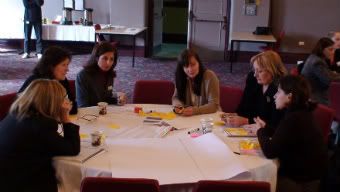 Part of being Word people is to reflect on our life and faith through the Word. These faith-sharing skills are essential for your team members who will lead dismissal sessions and other gatherings of catechumens because faith-sharing will help the catechumens connect Scripture to their daily lives.
Part of being Word people is to reflect on our life and faith through the Word. These faith-sharing skills are essential for your team members who will lead dismissal sessions and other gatherings of catechumens because faith-sharing will help the catechumens connect Scripture to their daily lives.
People learn best how to effectively lead faith-sharing by doing faith-sharing themselves. Yet, some catechists and team members don’t regularly participate in this discipline which may be as important as daily prayer. And when they do, some tend simply to state theology or doctrine without connecting it to their own personal situation. That is, they don’t answer the “so what” question: What difference does this Scripture passage make in my life today? Answering this question helps lead a person to conversion by inviting Christ, the Word, to speak to that person’s life today.
To help team members learn how to do and lead faith-sharing, use this simple process with them. You can do it as part of each team gathering, in pairs, small groups, or all together if your team is not too large.
- Begin your faith-sharing by praying together. You can use the Opening Prayer for the Sunday that you will be discussing.
- Invite someone to read aloud the Gospel for the Sunday. Ask participants just to listen with open ears and minds.
- Invite another person to read aloud the Gospel again. This time, ask participants to write down words and phrases from the reading that strike them.
- In pairs, small groups, or all together, discuss what struck you about the Gospel reading.
- Invite a person to read aloud the First Reading for the Sunday. (The Gospel reading and the First Reading are connected by a common theme or image.) Again, ask the participants to just listen carefully.
- Invite another person to read aloud the First Reading again. Ask the participants to write down words and phrases that strike them.
- In pairs, small groups, or all together, discuss what struck you about the First Reading.
- In pairs, small groups, or all together, discuss what is happening in the life of the community or in the world right now that needs to hear this Gospel and First Reading.
- In pairs, small groups, or all together, discuss what is happening in your own life right now that needs to hear this Gospel and First Reading.
- All together, discuss what was happening in the biblical communities that the Gospel and First Reading were originally trying to address. The team director or an assigned team member might share some prepared background information about the readings.
- Discuss any other exegetical, seasonal, or liturgical context for the readings.
- Share some prayerful silence together to let the Spirit lead each person to a new insight for his or her life.
- Journal or share with the group what concrete action or commitment you will take this week to live these readings in your life.
- Based on your discussions and reflections, discern the “message” that God’s word is trying to communicate to your community and to your catechumens in this particular time and place.
- End with a prayer of thanksgiving for God’s Word.


















What a timely article for our RCIA Team. Last night we were just discussing that we need to spend more time reflecting and learning instead of merely reporting and catching up on what the team already knows and does well.
When do we ever take the time to do what we expect our catechumens to do at dismissal. This is an excellent opportunity for us as a team to begin to exercise what we should be doing as a team, Growing Together in Faith.
Hi Elaine. I’m glad to hear the post will be put to good use!